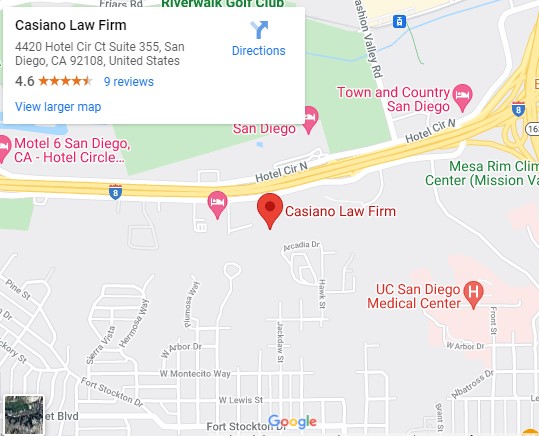Trust Accounting Disputes Lawyer in San Diego, California
When a trustee in San Diego, California, agrees to oversee a trust, they accept a lot of responsibility. They will be required to maintain meticulous records while acting as trustees. They might be required to submit an accounting, and their records from maintaining the trust will be crucial in the event of a disagreement. Trustees should retain legal counsel on their record-keeping responsibilities and other obligations.
Likewise, when a trustee doesn’t seem to uphold their duties, beneficiaries may need to hire an attorney to assist them in trust accounting disputes. Consult a skilled San Diego trust litigation attorney at Casiano Law Firm if you’re embroiled in a trust accounting dispute.
San Diego trust accounting dispute lawyer Vinny is dedicated to offering his clients the greatest level of individualized service while upholding the strictest confidentiality. Please get in touch with the San Diego trust litigation law firm to discuss how Attorney Vinny may assist in settling your dispute.
Why do I need a Trust Accounting Disputes Lawyer in California?
Trust accounting disputes can become long nightmares for all parties if handled improperly. A trustee, beneficiary, or heir’s error could be expensive in terms of money and time. A trust litigation attorney who focus on trust litigation have the knowledge and experience to handle trust issues effectively.
When the trust administration is intricate, a knowledgeable trust litigation attorney can make all the difference in resolving your trust dispute favorably. The trust accounting disputes attorney at Casiano Law Firm can assist you in upholding your rights and resolving any trust accounting disputes, whether you are a trustee, beneficiary, or heir.
California trust laws can be complicated, but trusts are one of the best estate planning tools. Contact Casiano law firm in San Diego, California, to get help today!
Call Us Today! (619) 800-6820
What is Trust Accounting?
Because they are fiduciaries, trustees have a higher duty of care to the trust’s beneficiaries. They are required by law to make wise investments, which can include diversifying their portfolios and using different professional talents they have acquired, such as real estate evaluation skills. Additionally, they should inform beneficiaries of their actions regarding the trust and the results of those acts to prevent disagreements or worries on the side of beneficiaries.
It may be necessary to provide a trust accounting because the trust instrument’s terms require it, a beneficiary asks for it, the trust relationship has terminated, or a petition for mandatory accounting has been submitted by an interested party.
Trust accountings give information about the activities and state of the trust, which may include:
- Principal received
- Income received
- Investments and related capital gains + losses
- Administrative costs
- Income balance
- Current principal
- Trustee commissions
- Sales
A trust accounting report will detail the amount of actual cash left over for any expenditures and the final distribution. A trustee should be able to back up a trust accounting with documents such as check cancellation statements, purchase and sale receipts, and bank and investment account details. All trustee actions during the life of the trust must typically be spelled out when a trust accounting is required by the court.
Any accounting filed with the court must be accompanied by an affidavit. The accounting party should sign the affidavit, saying that there are no errors or omissions that would harm a creditor or other interested party and that the account includes a true statement of all revenues and disbursements on behalf of the estate.
For legal issues with trusts and their accounting, consult esteemed trust administration attorney Vinny in San Diego.
Trust Accounting Disputes
When there is a dispute regarding a trust’s accounting, a petition to order a trustee to provide an accounting may be submitted to the court. Those who can file this petition include:
- Beneficiary
- Creditor
- Public administrator
- Attorney general
- Successor trustee
- Co-trustee
Additionally, the court has the authority to request a trust accounting independently. For instance, the court can do so about a removal case.
Beneficiaries have the right to sue a trustee. They can request compulsory accounting in court if the trustee fails to give a trust accounting to them formally or does so insufficiently. The beneficiary may request the trustee’s dismissal, suspension, or replacement during the same legal action.
A beneficiary must convince the court that mandatory accounting is in the estate’s best interests. The court may require a trustee to submit an interim or final account within a certain time. Without a petition or issuance of process, the court may suspend, alter, or revoke letters issued, remove a lifelong trustee, or modify his powers if a trustee ordered to account fails to do so.
It’s important to follow proper legal procedures when disputing the accounting of a trust. Call trusted San Diego trust litigation law firm, Casiano Law Firm, to schedule a consultation if you have any concerns.
Call Us Today! (619) 800-6820
What Does Trust Accounting Offer?
As an administrative figure, the trustee is responsible for keeping track of all trust assets. This accounting encompasses all continuous payments, proceeds, income, and assets, as well as when, how, and a paper trail to support disbursements. You should include the following documents with your records:
- The check number that was used to cover each specific estate expense
- Bill payments with the date, amount, payee, and payment reason
- Clear time frames concerning accounting
- Losses incurred by selling or otherwise disposing of assets
- Net losses incurred by a company
- Keep records of any disbursements to beneficiaries
- Information about the trustee’s and its agents’ compensation
- The connection between the trustee and the agents
- A thorough breakdown of the time you spent managing the trust
- Statements of Principal and Income Received and
- Disbursed
- Asset and liability statements
- A statement that the recipient may file a court review
This indeed sounds like a lot of work. These criteria include every aspect of the trust administration. As a result, it also carries a lot of liability from angry beneficiaries. With such high stakes, it’s best to have an experienced trust accounting disputes lawyer by your side. Call us to learn more!
Accounting is the Perfect Tool for Trustees.
Accounting is the ideal tool for a trustee to perform the following:
- Inform the beneficiaries of the activities,
- Ask for their approval before doing those things.
- Have a smooth administration and distribution of the trust’s assets without being concerned about potential litigation.
Beneficiaries frequently presume the worst when a trustee’s actions are kept a secret from them. And for a good reason: the majority of trustees who withhold information do so because they have something to conceal.
Every fiduciary is held to the highest accountability standards, whether as trustee, executor, or conservator. Beneficiaries are continuously able to criticize their conduct. Fiduciaries are subject to various obligations and liabilities that need to guide their behavior. They must act with the utmost care in every situation (and every act they choose not to take).
Call Us Today! (619) 800-6820
What are the effects of Trust Accounting Disputes?
A trust accounting may occasionally reveal that the property was harmed, wasted, or handled improperly by the trustee. In those circumstances, it permits any interested party to request an order canceling, amending, or suspending the letters that gave the trustee their authority. A lawyer should carefully review a trust accounting because, in most cases, hostility between a trustee and beneficiaries is insufficient to justify dismissal.
You should speak with Casiano Law Firm if you are involved in a trust accounting dispute in San Diego, California.
What is a Trustee?
A trustee is, first and foremost, a fiduciary. Among other duties, they have the fiduciary obligation to act in the trustees’ best interests. This implies that prompt disbursements and accurate, open accounting are both essential. According to the trust’s provisions, the trustee must take certain actions to ensure that the decedent’s intentions are carried out.
Trustee Accounting Responsibilities
The trust’s principal beneficiaries and current income are entitled to successor trustees’ loyalty and transparency. In plainer terms, a trustee must work in the beneficiaries’ best interests and keep accurate records of all payments, trust assets, and disbursements.
Due to probate laws, beneficiaries are typically permitted to ask for and receive an accounting. According to these regulations, a beneficiary of a trust’s income or principal has the right to be reasonably notified about the account, which means they can request evidence of the trust’s assets, opened and closed accounts, and even changes to the trust itself.
Until the trust is terminated, the trustee is responsible for fulfilling these responsibilities. This might occur following the passing of a beneficiary or even when assets achieve a predetermined minimum value, depending on the document’s structure.
Attacks on Trustees
Accounting is the first step in evaluating if the trustee performed properly, whether you are a beneficiary seeking to enforce your rights and safeguard your beneficial interests or a trustee trying to fulfill your obligations. The trust’s financial situation can be revealed if an accurate accounting for the trust has been submitted to the court. It will be looked into and finally judged as to whether it is reasonable or not by a court of law. The court has the authority to impose a personal fee against a Trustee who abuses their authority.
Call Us Today! (619) 800-6820
Beneficiaries' Rights
Let’s suppose there is a current beneficiary who feels mistreated and wants to seek certain documents. The issue is brought before a court if the trust administrator is uncooperative or if there is cause to suspect they are lying.
In this situation, a beneficiary must request a court order to obtain formal accounting data. The following requirements must be met before filing the petition:
- The trustee did not respond to a written request for at least 60 days.
- A gap in accounting reports for six months
- Existing trust accounting appears to be incorrect or questionable
How Long Can a Beneficiary File a Lawsuit?
Let’s say there are reasonable grounds to think a trustee has breached the deadlines above or behaved against the interests of the trust’s beneficiaries. Beneficiaries still have the option to sue in that scenario. They do not, however, hold onto this right indefinitely.
A beneficiary, however, has a limited time to file a lawsuit. Only if the breach of trust occurred less than three years ago can beneficiaries file a lawsuit.
Call Us Today! (619) 800-6820
Call A San Diego Trust Accounting Disputes Lawyer Now!
Trusts are important estate planning tools so people can care for their loved ones. When people attempt to understand their legal rights and obligations on their own, the complicated California probate code leads to many haphazard decisions. These initiatives to cut costs ultimately wind up costing far more in the long term.
Please do not hesitate to contact experienced trust litigation attorney Vinny for legal counsel and assistance if you are a trustee, executor, conservator, or beneficiary of a trust, will, or conservatorship estate.
Casiano Law Firm has experience handling legal problems involving trust accounting. Attorney Vinny can address any inquiries you may have and help you through each stage of the dispute procedure. Let a reliable attorney to help you make sure that the wishes of your loved one are carried out promptly and appropriately. Call respected California estate planning law firm, Casiano Law Firm, today!
Call Us Today! (619) 800-6820

